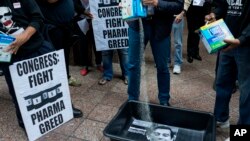A Senate committee tasked with protecting seniors is launching an investigation into prescription drug pricing, responding to public anxiety about companies hiking prices for once-inexpensive medicines.
The Senate's special committee on aging said Wednesday it requested documents and information from Turing Pharmaceuticals, Valeant Pharmaceuticals and two other drug companies that have been spotlighted for recent price spikes.
The move comes amid public outcry over the trend, which first made headlines when Turing raised the price of Daraprim by 5,000 percent after obtaining rights to the drug. The drug is the only U.S.-approved treatment for a deadly parasitic infection called toxoplasmosis.
Valeant is already under investigation by members of Congress for its general business strategy, which involves buying smaller drug developers and then jacking up prices on their medicines.
Both Turing and Valeant have also received multiple subpoenas from federal prosecutors seeking information about drug pricing and other policies.
Senators Susan Collins, R-Maine, and Claire McCaskill, D-Missouri, said a hearing on the issue is tentatively scheduled for Dec. 9. Collins chairs the aging committee and McCaskill is its ranking Democrat.
"We need to get to the bottom of why we're seeing huge spikes in drug prices that seemingly have no relationship to research and development costs," said McCaskill, in a statement. She added that some of the increases resemble "little more than price gouging."
The committee also sent letters to Retrophin Inc. of San Diego and Rodelis Therapeutics of Alpharetta, Georgia. The lawmakers question Retrophin about its decision to raise the price of a kidney drug, Thiola, from $1.50 per tablet to $30 per tablet. The letter to Rodelis questions the company's price increase on a tuberculosis drug by more than 2,000 percent to $10,800 per bottle.
The Senate aging committee was initially formed to oversee Social Security, Medicare and other programs for seniors. It has no authority to write laws but often investigates industries that prey on seniors.
Last week a national poll found that sky-high drug prices remain the No. 1 health concern among Americans, according to the nonpartisan Kaiser Family Foundation. Responding to this public outrage, Democratic presidential candidates Hillary Clinton and Bernie Sanders have each laid out plans to use federal authority to curb price increases.
Overall, prescription drug prices have been on the rise for years. Between 2008 through 2014, average prices for the most widely used brand-name drugs jumped 128 percent, according to prescription benefit manager Express Scripts Holding Co. In 2014, the company estimated that total U.S. prescription drug spending increased 13 percent. Reasons include increasing research costs, insufficient competition and drug shortages.




